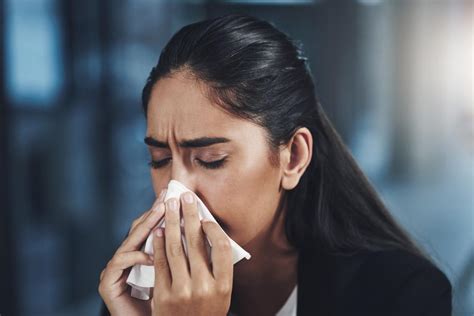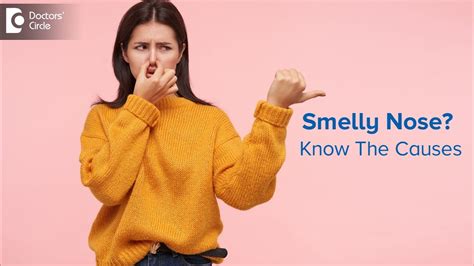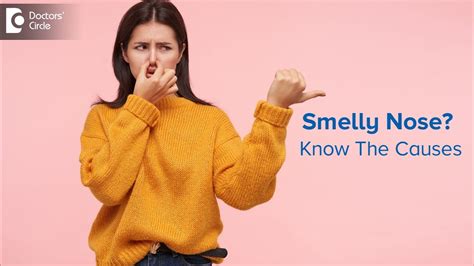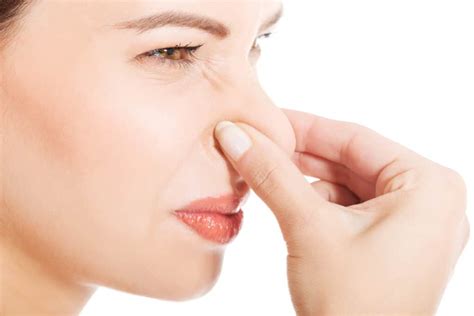Intro
Discover the causes of weird smell in nose, including sinus infections, nasal polyps, and olfactory disorders, and learn how to diagnose and treat these conditions to eliminate unpleasant odors and phantosmia.
The human sense of smell is a complex and vital part of our daily lives, influencing our perceptions of taste, memory, and even emotional well-being. However, when a weird smell in the nose persists, it can be both distracting and concerning. This phenomenon, known as phantosmia, can have various underlying causes, ranging from benign to more serious health issues. Understanding these causes is crucial for addressing the problem effectively and restoring one's sense of smell to its normal functioning state.
A weird smell in the nose can manifest in different ways; some people might experience a persistent rotten or metallic smell, while others might perceive a sweet or chemical-like odor. These smells are not triggered by any external source but are rather a misinterpretation by the brain of signals from the olfactory system. The diversity in the types of smells perceived can hint at different underlying causes, necessitating a comprehensive approach to diagnosis and treatment.
The persistence of a weird smell in the nose can significantly impact an individual's quality of life, affecting their eating habits, social interactions, and overall comfort. It's essential to recognize that this condition is not merely a nuisance but can be a symptom of an underlying health issue that requires medical attention. By exploring the various causes and seeking appropriate medical advice, individuals can take the first steps towards resolving the issue and regaining their normal sense of smell.
Causes of Weird Smell in Nose

The causes of a weird smell in the nose can be broadly categorized into several groups, including infections, anatomical issues, neurological problems, and exposure to certain substances. Infections such as sinusitis, where the sinuses become inflamed or infected, can lead to the production of excess mucus, which may cause a bad smell. Similarly, conditions like gastroesophageal reflux disease (GERD) can cause stomach acid to flow up into the throat, leading to a sour taste and smell.
Anatomical issues, such as a deviated septum or nasal polyps, can also contribute to the perception of weird smells. These conditions can obstruct the normal flow of air through the nasal passages, leading to an accumulation of mucus and debris, which can cause unpleasant odors. Furthermore, neurological conditions like Parkinson's disease, schizophrenia, and seizure disorders can affect the brain's ability to process smells correctly, resulting in phantosmia.
Common Causes
Some of the most common causes of weird smells in the nose include: - Sinus infections - Allergies - Anatomical issues such as a deviated septum - Neurological conditions - Exposure to chemicals or pollutants - Certain medications - Nutritional deficienciesDiagnosing Weird Smell in Nose

Diagnosing the cause of a weird smell in the nose involves a combination of medical history, physical examination, and sometimes, additional tests. A healthcare provider will typically start by asking questions about the nature of the smell, its duration, and any factors that seem to trigger or relieve it. They will also perform a physical examination, including an examination of the nasal passages and sinuses, to look for signs of infection, obstruction, or other abnormalities.
In some cases, further testing may be necessary to determine the underlying cause. This could include imaging tests like CT or MRI scans to evaluate the sinuses and brain, blood tests to check for infections or nutritional deficiencies, or smell tests to assess the functioning of the olfactory system. The choice of tests depends on the suspected cause and the patient's overall health status.
Diagnostic Steps
The diagnostic process for weird smells in the nose typically involves: 1. Medical history and physical examination 2. Nasal endoscopy to visualize the nasal passages 3. Imaging tests (CT or MRI scans) 4. Blood tests for infections or deficiencies 5. Smell tests to evaluate olfactory functionTreating Weird Smell in Nose

Treatment for a weird smell in the nose is tailored to the underlying cause. For infections such as sinusitis, antibiotics or antifungal medications may be prescribed to clear up the infection. In cases of allergies, avoiding allergens and using antihistamines or corticosteroids can help alleviate symptoms. Anatomical issues like a deviated septum or nasal polyps may require surgical intervention to correct the obstruction and improve airflow through the nasal passages.
For neurological causes, treatment focuses on managing the underlying condition, which could involve medications, therapy, or other interventions. In some cases, where the cause is related to exposure to certain substances, avoiding these triggers can resolve the issue. Nutritional deficiencies, if identified, can be addressed through dietary changes or supplements.
Treatment Approaches
Treatment approaches for weird smells in the nose include: - Medications (antibiotics, antihistamines, corticosteroids) - Surgical interventions (for anatomical issues) - Avoidance of triggers (allergens, chemicals) - Nutritional supplements (for deficiencies) - Management of underlying neurological conditionsPreventing Weird Smell in Nose

Prevention plays a significant role in managing weird smells in the nose. Practicing good hygiene, including regular nasal irrigation to keep the nasal passages clean, can help prevent infections. Avoiding allergens and irritants, such as strong chemicals or pollutants, can reduce the risk of triggering allergic reactions or damaging the olfactory system.
Maintaining a healthy lifestyle, including a balanced diet rich in nutrients that support olfactory health, such as vitamin D and zinc, can also be beneficial. Staying hydrated is essential for keeping the mucous membranes healthy and functioning properly. In addition, managing stress through relaxation techniques and getting adequate sleep can help prevent conditions that might lead to phantosmia.
Preventive Measures
Preventive measures for weird smells in the nose include: - Practicing good nasal hygiene - Avoiding allergens and irritants - Maintaining a healthy diet - Staying hydrated - Managing stress and getting adequate sleepLiving with Weird Smell in Nose

Living with a weird smell in the nose can be challenging, but there are strategies to cope with the condition. Keeping a diary to track when the smells occur and any potential triggers can be helpful in identifying patterns and managing the condition. Support from family and friends can also make a significant difference, as can joining support groups to connect with others who are experiencing similar issues.
In some cases, therapy, such as cognitive-behavioral therapy (CBT), can help individuals cope with the emotional impact of living with phantosmia. Additionally, exploring alternative therapies like acupuncture or aromatherapy may provide relief for some people, although the effectiveness of these approaches can vary.
Coping Strategies
Coping strategies for living with weird smells in the nose include: - Keeping a symptom diary - Seeking support from loved ones or support groups - Exploring stress management techniques - Considering alternative therapies - Focusing on overall health and wellnessFuture Perspectives

As research into the causes and treatments of weird smells in the nose continues, there is hope for more effective management and potential cures. Advances in medical imaging and diagnostic techniques are improving our understanding of the complex interactions between the nose, brain, and environment. Furthermore, the development of new medications and therapies, including those targeting specific neurological pathways, holds promise for better treatment outcomes.
Public awareness campaigns can also play a crucial role in reducing the stigma associated with phantosmia and encouraging individuals to seek medical help sooner. By fostering a community that supports open discussion and education about weird smells in the nose, we can work towards a future where this condition is better understood and more effectively managed.
Emerging Trends
Emerging trends in the management of weird smells in the nose include: - Advanced diagnostic technologies - New therapeutic approaches - Increased public awareness and education - Growing support for research into phantosmiaConclusion and Next Steps

In conclusion, weird smells in the nose are a complex phenomenon with a variety of causes and treatment approaches. By understanding the underlying reasons for these smells and seeking appropriate medical care, individuals can take the first steps towards recovery. It's essential to approach this condition with patience, persistence, and an open mind, exploring all available options and maintaining a positive outlook.
For those experiencing weird smells in the nose, it's crucial to stay informed, seek support, and advocate for further research into this condition. By doing so, we can work together towards a better future for those affected by phantosmia, one that is filled with hope, understanding, and effective solutions.
What are the most common causes of weird smells in the nose?
+The most common causes include sinus infections, allergies, anatomical issues like a deviated septum, neurological conditions, exposure to chemicals or pollutants, certain medications, and nutritional deficiencies.
How is a weird smell in the nose diagnosed?
+Diagnosis involves a combination of medical history, physical examination, and sometimes additional tests like imaging scans, blood tests, or smell tests to determine the underlying cause.
Can weird smells in the nose be prevented?
+Yes, prevention measures include practicing good nasal hygiene, avoiding allergens and irritants, maintaining a healthy diet, staying hydrated, and managing stress.
What are the treatment options for weird smells in the nose?
+Treatment options depend on the cause and may include medications, surgical interventions, avoidance of triggers, nutritional supplements, and management of underlying neurological conditions.
How can I cope with living with a weird smell in my nose?
+Coping strategies include keeping a symptom diary, seeking support, exploring stress management techniques, considering alternative therapies, and focusing on overall health and wellness.
We hope this comprehensive guide has provided you with valuable insights into the causes, diagnosis, treatment, and prevention of weird smells in the nose. If you or someone you know is experiencing this condition, we encourage you to seek medical advice and explore the various resources available for support. By working together and staying informed, we can better navigate the complexities of phantosmia and strive towards a future with improved understanding and management of this condition. Please feel free to share your thoughts, ask questions, or seek further information in the comments below.
